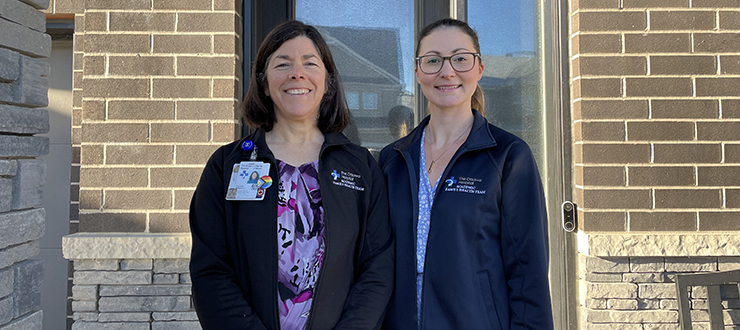
In 1921, researchers in Ontario made a breakthrough that marked a turning point in the treatment of diabetes. Their discovery of insulin changed the outlook of the disease from a certain death sentence to a manageable condition.
On the centennial anniversary of this life-saving drug, Canada is seeing rising rates of diabetes. Currently, one in three Canadians has diabetes or prediabetes. The most common form is type 2 diabetes, which at one time was far more prominent in adults but is becoming more common in younger people.
If left untreated, type 2 diabetes can lead to serious complications, including kidney disease, blindness, heart attack, and stroke.
“That is why it is so important to reach out to your health-care team if you believe that you have any symptoms or risk factors,” said Annie Garon-Mailer, Advanced Practice Nurse at The Ottawa Hospital’s Foustanellas Endocrine and Diabetes Centre, the leading referral centre in Eastern Ontario for complex diabetes care.
This is a condition that can be managed, but only if it is properly diagnosed.
“It is so rewarding to help patients manage the disease and to see how just a few lifestyle changes can diminish symptoms and improve their quality of life.”
Being able to recognize common symptoms and risk factors may also reduce your risk of developing type 2 diabetes.
First, what is diabetes?
Diabetes affects how your body turns food into energy.
People living with type 1 diabetes cannot produce insulin and are insulin dependent, while people with type 2 diabetes cannot effectively use the insulin that their bodies produce. Insulin regulates blood sugar, helping the glucose from food get into the body’s cells to be used for energy.
Type 1 diabetes often develops during childhood or adolescence. Type 2 diabetes usually develops in adulthood, though it is increasingly being seen in children. Roughly 90 percent of people living with diabetes have type 2 diabetes.
What are the common symptoms?
The following are the most common symptoms of type 2 diabetes:
- Increased thirst
- Increased hunger
- Frequent urination
- Dramatic weight gain or loss
- Extreme fatigue or lack of energy
- Blurred vision
- Frequent or recurring infections
- Slow-healing cuts and bruises
- Numbness or tingling of the hands or feet
- Difficulty attaining or maintaining an erection
- Diabetes ketoacidosis (a serious complication that can be life threatening)
However, some people diagnosed with type 2 diabetes may not notice any symptoms.
Am I at risk?
Having any of the following conditions can increase your risk of developing type 2 diabetes:
- High blood pressure
- High cholesterol
- A high BMI (especially if body fat is mainly stored in your abdomen)
- Prediabetes
- Polycystic Ovary Syndrome (PCOS)
- Psychiatric disorders (schizophrenia, depression and bipolar disorder)
- Obstructive sleep apnea
- Areas of darkened skin (called acanthosis nigricans)
Other risk factors include being over the age of 40, having a history of diabetes in your immediate family, and, although the reason is unclear, your ethnic background (being of African, Arab, Asian, Hispanic, Indigenous or South Asian descent).
To find out if you are at a higher risk, take the Canadian Diabetes Risk Questionnaire.
How can I reduce my risk?
While there are currently no known ways to reduce the risk of type 1 diabetes, there are several lifestyle changes you can adopt to reduce your risk of type 2 diabetes:
- Eat healthily: Following a healthy meal plan is the first step in reducing your risk. Be sure to make these foods staples of your diet: fruits, vegetables, plant-based proteins, whole grains, dairy, lean meats, oily fish, nuts and healthy oils.
- Exercise regularly: Maintaining an active lifestyle has an array of health benefits, both physical and mental. If you work at a computer all day, limit the amount of time you spend sitting by standing up and moving around every 20-30 minutes.
- Maintain a healthy bodyweight: If you have prediabetes and are overweight, losing five percent of your bodyweight can delay or even prevent the development of type 2 diabetes.
What are the ways to manage type 2 diabetes?
When many people think of diabetes treatment, they think of a needle filled with insulin. But the reality is that a person living with type 2 diabetes may not require insulin therapy. The same lifestyle changes that can reduce the risk of type 2 diabetes can also help manage blood sugar levels, which can be monitored with a home blood glucose meter. Insulin is not the only medication available either. Since the discover of insulin 100 years ago, many advancements have been made, including non-insulin oral medications and injections.
Diabetes is a chronic illness, but it can be managed through lifestyle changes and medication. Though an initial diagnosis may be stressful, you can still enjoy a great quality of life. And whether you are newly diagnosed or want to gain better control of managing your diabetes, The Ottawa Hospital is here to help you achieve your goals.
Discover more diabetes resources from The Ottawa Hospital.

Support patient care and research at
The Ottawa Hospital
You might also like…
The Ottawa Hospital and YouTube Health partner to increase access to health information in Canada
Looking for health information online can lead you down a rabbit hole of misinformation. That’s why we’ve launched a series of videos with YouTube Health. Presented in both English and French by experts from across The Ottawa Hospital, these videos cover everything you need to know about an array of common medical conditions.
Looking to get screened for cancer but don’t have a family doctor? Make an appointment with our “Superscreener”
Regular cancer screening can help save lives. For people living in Eastern Ontario who do not have a primary care provider, the Champlain Screening Outreach Program offers screening services for breast, cervical, colorectal and lung cancer. Find out how to book your appointment with Nurse Practitioner Sarah Junkin-Hepworth, our “Superscreener.”
New gender-affirming surgery clinic now accepting patients
The Ottawa Hospital’s new gender-affirming surgery clinic is truly one of a kind. Launched in September 2023, it’s the only clinic in Ontario to offer trans and non-binary patients facial, top and bottom procedures. Plastic Surgeon Dr. Nicholas Cormier and his team are happy to announce that they are now accepting patient referrals from physicians.
“Stewards of hormones”: Our Gender Diversity Specialty Clinic guides medically complex patients on their affirmation journey
Often, trans and non-binary patients struggle to find health-care providers to support them on their affirmation journey. It is even more difficult for patients with complex medical needs. That’s why we launched our Gender Diversity Specialty Clinic, one of the first of its kind in Canada.
Healing through art: Congratulations to the winners of the TRIAS Art Prize
Did you know that art has the power to heal? This year, The Ottawa Hospital and the Ottawa Art Gallery launched the TRIAS Art Prize to recognize the role of artists in healing and wellness. We recently announced the winners, and you’ll see their artwork around the hospital in the new year. Get a sneak preview today.
Type 2 diabetes: Are you at risk?
Type 2 diabetes is a serious health condition that affects nearly two million Canadians (and rising), but there are actions you can take today to reduce your risk. Our experts offer evidence-based tips on how to support your body’s blood sugar balance system and keep yourself healthy.


 To reset, hold the Ctrl key, then press 0.
To reset, hold the Ctrl key, then press 0.






Comment on this post